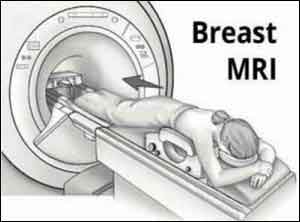- Home
- Editorial
- News
- Practice Guidelines
- Anesthesiology Guidelines
- Cancer Guidelines
- Cardiac Sciences Guidelines
- Critical Care Guidelines
- Dentistry Guidelines
- Dermatology Guidelines
- Diabetes and Endo Guidelines
- Diagnostics Guidelines
- ENT Guidelines
- Featured Practice Guidelines
- Gastroenterology Guidelines
- Geriatrics Guidelines
- Medicine Guidelines
- Nephrology Guidelines
- Neurosciences Guidelines
- Obs and Gynae Guidelines
- Ophthalmology Guidelines
- Orthopaedics Guidelines
- Paediatrics Guidelines
- Psychiatry Guidelines
- Pulmonology Guidelines
- Radiology Guidelines
- Surgery Guidelines
- Urology Guidelines
MRI superior to mammography for earlier breast cancer detection in women with familial risk: Lancet

MRI superior to mammography for earlier breast cancer detection in women with familial risk finds a Lancet study.
Magnetic Resonance Imaging (MRI) is superior to mammography in detecting breast cancers at an earlier stage in women with a family history of the disease, revealed a study published in the high impact journal Lancet Oncology.
The findings of the study suggested breast MRI over mammography as the reduced number of late-stage cancer recognized in the rounds of incidents may reduce the use of adjuvant chemotherapy and thus decrease the rate of mortality associated with breast cancer. However, the advantages of the MRI screening approach might be at the cost of more false-positive results, especially at high breast density.
Screening guidelines for familial risk of breast cancer varies widely across countries. The study aimed to compare MRI screening with mammography in women with familial risk via randomized controlled trial (FaMRIsc).
The authors conducted a multicentre, randomized, controlled trial in 12 hospitals in the Netherlands where women were eligible to participate if they were aged 30–55 years and had a cumulative lifetime breast cancer risk of at least 20% because of a familial predisposition, but were BRCA1, BRCA2, and TP53 wild-type. Participants who were breastfeeding, pregnant, had a previous breast cancer screen or had a previous diagnosis of ductal carcinoma in situ were eligible, but those with a previously diagnosed invasive carcinoma were excluded.
Participants were randomly allocated (1:1) to receive either annual MRI and clinical breast examination plus biennial mammography (MRI group) or annual mammography and clinical breast examination (mammography group). Randomization was done via a web-based system and stratified by center. Women who did not provide consent for randomization could give consent for registration if they followed either the mammography group protocol or the MRI group protocol in a joint decision with their physician. Results from the registration group were only used in the analyses stratified by breast density. Primary outcomes were number, size, and nodal status of detected breast cancers. Analyses were done by intention to treat. This trial is registered with the Netherlands Trial Register, number NL2661.
Between Jan 1, 2011, and Dec 31, 2017, 1355 women provided consent for randomization and 231 for registration
- 675 of 1355 women were randomly allocated to the MRI group and 680 to the mammography group.
- 218 of 231 women opting to be in a registration group were in the mammography registration group and 13 were in the MRI registration group.
- The average number of screening rounds per woman was 4·3.
- More breast cancers were detected in the MRI group than in the mammography group.
- Invasive cancers were smaller in the MRI group than in the mammography group and less frequently node positive (24 in the MRI group and 8 in the mammography group).
- Tumour stages of the cancers detected at incident rounds were significantly earlier in the MRI group of 25 in the MRI group vs one of 15 in the mammography group were stage T1a and T1b cancers; one (4%) of 25 in the MRI group and two (13%) of 15 in the mammography group were stage T2 or higher and node-positive tumors were less frequent.
- All seven tumors stage T2 or higher were in the two highest breast density categories (breast imaging reporting and data system categories C and D.
- One patient died from breast cancer during follow-up (mammography registration group).
The authors concluded that MRI screening-detected cancers at an earlier stage than mammography and suggested that MRI screening for breast cancer may reduce the chances of adjuvant chemotherapy and mortality associated risks as well.
For further reference, please click on the link
DOI:https://doi.org/10.1016/S1470-2045(19)30275-X

Disclaimer: This site is primarily intended for healthcare professionals. Any content/information on this website does not replace the advice of medical and/or health professionals and should not be construed as medical/diagnostic advice/endorsement or prescription. Use of this site is subject to our terms of use, privacy policy, advertisement policy. © 2020 Minerva Medical Treatment Pvt Ltd